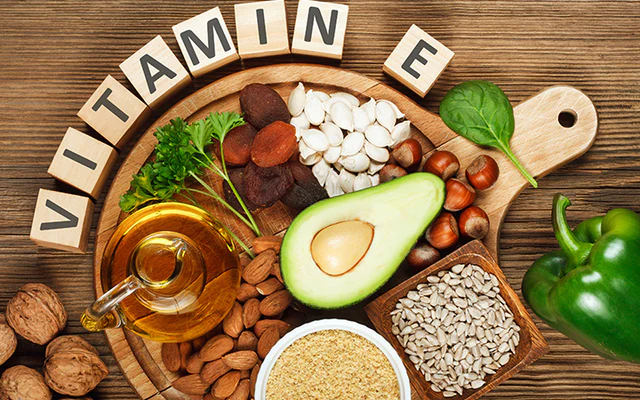
Discover the importance of Vitamin E and its numerous health benefits. In this comprehensive blog, we delve into the sources of Vitamin E, its role as a powerful antioxidant, and its impact on skin health, immune function, and overall well-being. Learn practical tips on incorporating Vitamin E-rich foods into your diet, explore supplementation guidelines, and stay updated with the latest research findings. Educate and empower yourself with a thorough understanding of Vitamin E.
Vitamin E Overview
Vitamin E is a powerful fat-soluble antioxidant that plays a crucial role in protecting our cells from damage caused by free radicals. It consists of eight different compounds: four tocopherols and four tocotrienols, with alpha-tocopherol being the most active form in the human body.
Health Benefits of Vitamin E
1. Antioxidant Protection: Vitamin E acts as a potent antioxidant, neutralizing free radicals and protecting cells from oxidative damage, which can contribute to aging and various diseases.
2. Skin Health: Vitamin E supports skin health by helping to maintain its moisture, elasticity, and overall appearance. It’s often used in skincare products and can help with conditions like dry skin, scars, and sunburn.
3. Immune Function: Vitamin E plays a role in supporting immune function, helping the body fight off infections and illnesses.
4. Heart Health: Some studies suggest that Vitamin E may help improve blood vessel function and reduce the risk of heart disease by preventing the oxidation of LDL cholesterol.
Diseases and Conditions Benefited by Vitamin E
1. Oxidative Stress and Aging: Vitamin E’s antioxidant properties help combat oxidative stress, which can contribute to aging and various age-related diseases.
2. Skin Conditions: Vitamin E can help improve skin health and appearance, aiding in the treatment of conditions like dry skin, scars, and sunburn.
3. Eye Disorders: Some research suggests that Vitamin E may play a role in reducing the risk of age-related macular degeneration and cataracts.
4. Heart Disease: Vitamin E may help improve blood vessel function and reduce the risk of heart disease by preventing the oxidation of LDL cholesterol.
Recommended Dosage of Vitamin E
The recommended daily allowance (RDA) for Vitamin E varies depending on age, gender, and life stage:
- Infants (0-6 months): 4 mg (milligrams)
- Infants (7-12 months): 5 mg
- Children (1-3 years): 6 mg
- Children (4-8 years): 7 mg
- Children (9-13 years): 11 mg
- Teens (14-18 years): 15 mg for both males and females
- Adults (19 years and older): 15 mgFood Sources of Vitamin E
1. Nuts and Seeds: Almonds, sunflower seeds, and hazelnuts are excellent sources of Vitamin E.
2. Vegetable Oils: Wheat germ oil, sunflower oil, and safflower oil are rich in Vitamin E.
3. Green Leafy Vegetables: Spinach, broccoli, and kale contain Vitamin E.
4. Fruits: Avocado, mango, and kiwi are good sources of Vitamin E.
5. Fortified Foods: Some cereals and plant-based milk alternatives are fortified with Vitamin E.
Tips for Maximising Vitamin E Absorption:
– Pair with Healthy Fats: Since Vitamin E is fat-soluble, consuming it with healthy fats can enhance absorption. For example, adding avocado or olive oil to your salad can improve Vitamin E uptake.
– Storage and Cooking: Vitamin E is sensitive to heat and air. To preserve its potency, store Vitamin E-rich foods properly and avoid overcooking them.
In conclusion, Vitamin E is an essential nutrient with powerful antioxidant properties that support overall health, skin health, immune function, and heart health. By incorporating Vitamin E-rich foods into your diet and following the recommended dosage guidelines, you can harness the benefits of this vital vitamin to promote your well-being. Always consult with a healthcare professional before starting any supplementation regimen to ensure it’s appropriate for your individual needs.
